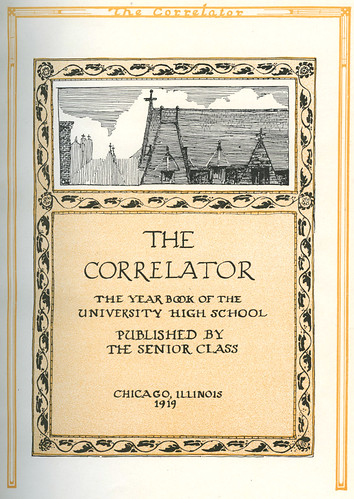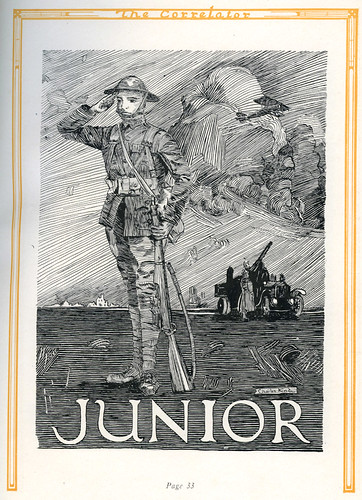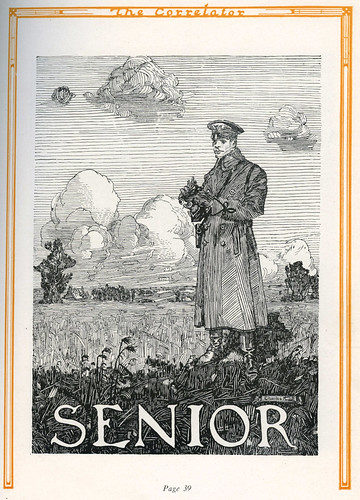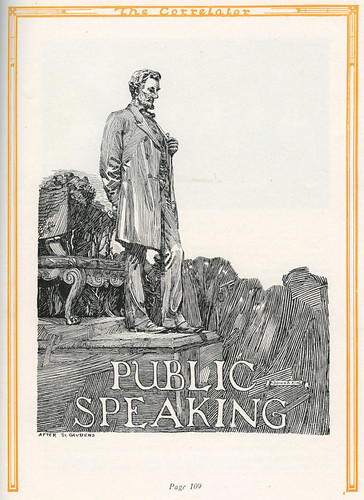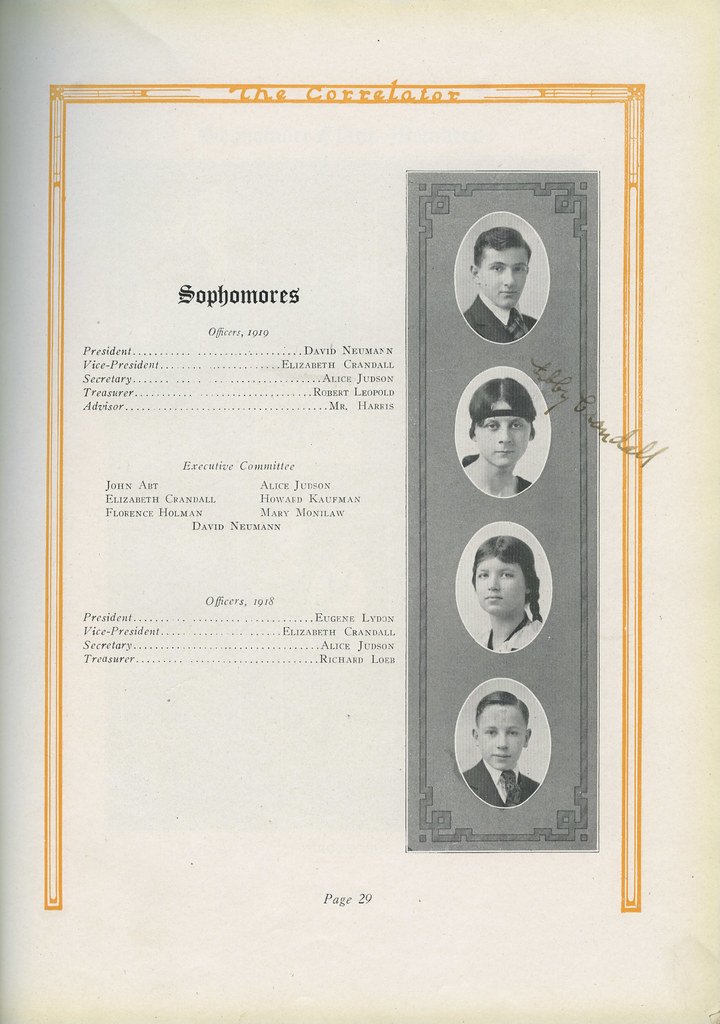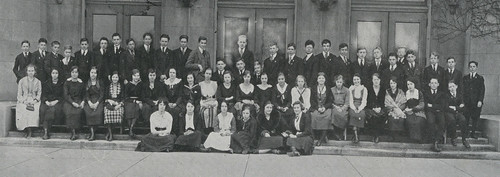He was a popular boy, depending on who you asked. The girls loved him, alright. Or did they? He had these ways about him. Sure, he was good looking, sure he was rich, but sometimes he acted, well, "cuckoo". Once, he tried on all the hats at a party. Another time, he crashed his car into a carriage, almost killing a woman and suffering a concussion in the process. He drove recklessly. He drank recklessly. He lied without flinching to his parents' face. Still, when a story broke in May of 1924, that Dickie Loeb was being held in connection with the Franks boy's murder, nobody believed it, not a soul.
Richard Albert Loeb was born June 11, 1905. He was the third of four sons. His father, Albert, began his career as a lawyer and became the Vice President of Sears and Roebuck. Albert and Anna Loeb had an impressive mansion in the Kenwood section on the South Side of Chicago, two blocks away from the Leopold home, as well as a summer estate in Charlevoix, Michigan.
When Richard was four and a half, his family, like Leopold's, employed a governess. Richard's governess was a Canadian girl named Emily Struthers. Miss Struthers was a rather strict disciplinarian and also tutored Richard extensively, which led to his skipping of several grades of school.
Although they lived less than two blocks apart, Richard and Nathan attended different schools. Richard attended the Lab school and later U High; the prep school affiliated with the University of Chicago. Richard graduated from U High when he was thirteen. He was admitted to the University of Chicago in the Fall. He was excited and pleased. He felt special.
Miss Struthers had discouraged Richard from associating with boys his own age when he was younger. Because he craved excitement, he read detective stories. He was not allowed to read them so he read them secretly. He also developed the habit of lying to avoid punishment. This habit extended to his parents as well to avoid unpleasant situations. This lying evolved from a method of avoiding negative situations, to a positive method of fabrication. Instead of simply saying he was not doing something his elders did not want him to do, he would also create a positive lie about something he was doing. Thus, if his parents said "do not play cards when you go into town", he would play cards, then lie and say he hadn't, but would also create a lie about doing a positive activity they would approve of. Not only was he not playing cards, he was studying in the library.
Richard said that he felt as a child that his family "more or less neglected him". He also stated that he felt they didn't mean to, and he was sure they had his best interests at heart. Yet, the feeling remained. At about the age of nine , the same time that his brother Tommy was born, he began to steal from his older brothers, from neighbors and from shops, acting out a secret adventure akin to those in his detective stories. He played "shadow" on the street and trailed people.
When he was still very young, partly perhaps due to his strict home life and the feeling that he was unduly restricted and held back, a situation he even then thought rather odd, Richard began to develop a phantasy life revolving around himself being in jail. He would picture himself in jail, being abused, locked up, laughed at and stared at. It allowed an outlet for the feelings of low self esteem and self pity that were raging inside him, feeling as he did, that he was unloved and not allowed pleasures and excitement that other boys were.
This phantisizing began to take a more important role in his life as he grew older, his imagination becoming an outlet for the excitement he craved, but was not allowed.
The phantasies grew in importance in his life, and the flip side of his jail phantasy began to emerge; this was the Master Criminal phantasy. In the Master Criminal phantasy, Richard imagined himself the leader of a gang, or at least of one other accomplice. Dr Glueck testified during the trial that in his opinion, all Richard Loeb's phantasies showed a desire for complete power and completeness. Later interpretations of the case would focus on the "complete power" of Glueck's statement with a Nietzschian zeal, while ignoring the possibly more significant "completeness." Richard Loeb was after more than power and control over others; he desired to create a complete person, capable of living out a complete life- something he found himself incapable of doing on his own. Thus he unconsciously sought out someone who could help him achieve that completeness, a complement to himself who would be strong where he was weak, an alter ego.
Dr Bernard Glueck brought up another one of Loeb's phantasies, often overlooked by historians and even by the other defense doctors, as Glueck noted that he put on par in importance with the other phantasies; this was the "Perfect Collegian" phantasy.
in the developing and in the carrying out of his activities which is of interest and which has not been brought out by the other examiners that one phantasy that ran through a considerable period of time was what he calls the perfect collegian phantasy.
In this phantasy, Loeb pictured himself a sophomore in college, the top of the class and the most popular, a great athlete, attractive and healthy. Once again Dr Glueck says this reinforces the notion that Richard was after Completeness.
In my estimation of the situation, what this boy was after in all this phantasying was to get a sense of complete power, a sense of completeness; and the physical exhilaration that went with all this carrying on to some extent satisfied this desire for power and completeness.
Although at first he was pleased with entering college so young, as it reinforced his ego and sense of self importance, once in school, at age fourteen, now freed from the control of his governess, without anyone at home to confide in, he found himself utterly incapable of relating on an equal footing to the boys who were 4, 5 and 6 years older than him.
And there were other problems. He was a smart boy. But there was enormous pressure upon him to live up to an ideal. He was expected to be brilliant. In reality, he didn't find many of his classes interesting. In high school he cribbed off others when he could. He did not put a lot of effort into his studies. It was a doable thing with a governess who tutored him straight through school.
But college was a completely different world, even if it was only down the street.
When Richard was nine, his brother Thomas was born. This created some hostility in the household regarding Richard's mother and the governess. Miss Struthers attempted to win the Richard's affection away from his mother and, for a while, was successful. Eventually Miss Struthers was dismissed. There were no more Governesses. Mrs Loeb took a more active role in her youngest son's upbrining.
As was the case with Leopold, the governess had, at least temporarily, overshadowed the affection for the mother.
Struthers was not like Leopold's governess in the field of sex, however. While Mathilda Wantz took liberties with Nathan, Struthers avoided all discussion of sex. Richard was eleven when he learned the difference between boys and girls- from the family chauffeur.
Richard did have one friend with whom he took part in several petty delinquencies; a boy named Jack Mengal that he met at the age of five. Together they stole a flower vase from a neighborhood house. They also played strip poker and once wrestled naked on a bed. Mengal and Richard drifted apart at about the age of fourteen. Mengal wound up in Pontiac Reformatory.
Miss Struthers left during Richard's first year at the University, after having a falling out with the family. The woman who had displaced Richard's mother had felt increasingly hostile at having to care for Richard's brother Tommy. She made accusations and was dismissed from the Loeb household.
At about this time, Richard and Nathan became friends. In Nathan, Richard found the perfect partner to his criminalistic fantasies. One can also see how Leopold's own personality, characteristics, and attributes merged with Loeb- and in a sense, gave him that sense of completeness he'd been craving. Loeb described the relationship of himself and Leopold as "the complete realization" of all his dreams and phantasies.
At first their relationship was cold. Leopold stated that at first he detested Loeb and believed the feeling was mutual. Yet they apparently hung around in the same group of seven or eight boys. Eventually their relationship warmed. Perhaps it was due to the closeness in their ages verses the discrepancy between their other friends, their attending the same college, living in the same neighborhood, both being Jewish. They were so different. Yet they had everything in common.
In the Fall of 1920 Leopold entered the University of Chicago in October as a Freshman. Loeb was now a Sophomore. By February, they were what Leopold described as "firm friends". They had also begun engaging in delinquencies.
